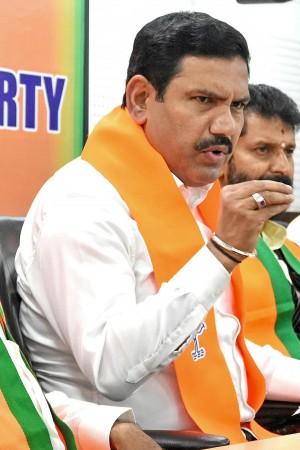
The Karnataka government's decision to revert to using ballot papers instead of electronic voting machines (EVMs) for upcoming local body elections has ignited a significant political controversy. The Bharatiya Janata Party (BJP) has strongly criticized this move, accusing the Congress-led state government of attempting to manipulate the electoral process. The BJP claims that by opting for ballot papers, the Congress is implicitly admitting to having come to power through electoral fraud.
B.Y. Vijayendra, the BJP's State President and MLA, expressed his discontent on social media, stating, "In this context, the 136 Congress MLAs who were elected in the 2023 state elections through EVMs should first resign. The nine Congress MPs elected to the Lok Sabha from Karnataka should also resign. They should contest again and win using ballot papers. Otherwise, they must admit that they have come to power through electoral fraud."
Vijayendra further criticized the Congress for its historical association with electoral malpractices, particularly during the era of ballot-based elections. He reminded the public of the infamous Emergency period imposed by the late Prime Minister Indira Gandhi, which was marred by allegations of electoral fraud.
"The people of this country have not forgotten that Prime Minister late Indira Gandhi imposed Emergency on the nation because of the court verdict against her election, which was tainted with fraud and malpractice," he stated.
BJP's allegations are rooted in historical instances where ballot papers were reportedly manipulated. Vijayendra cited an example from the 1990s when a BJP candidate's victory in Davanagere was allegedly overturned through dubious recounting practices, with reports of BJP ballot papers being found discarded in toilets.

Congress defends ballot paper decision
The Congress, on the other hand, has defended its decision, arguing that the move is aimed at restoring public trust in the electoral process. Karnataka's Minister for Law, H.K. Patil, explained that the decision was taken after observing discrepancies in the voters' list and a general decline in trust towards EVMs.
"Recently, people in Karnataka have observed many discrepancies in the preparation of the voters' list, and a large number of complaints have been received. Allegations have been made that many non-existent voters were included, and discussions have been ongoing for months. Meanwhile, trust in EVMs has generally been declining. Considering the lack of reliability, public sentiment, and opinions, the decision of the Cabinet to conduct elections through ballot papers instead of EVMs has been taken in this context," Patil emphasized.
The Karnataka cabinet has resolved to recommend necessary legal amendments to facilitate the use of ballot papers. This includes revising and reconstituting the voters' list to ensure a high-quality electoral roll.
The cabinet's decision is seen as a political move, with Deputy Chief Minister D.K. Shivakumar stating, "This is a political decision we have taken. The government has the power to recommend it to the SEC, and they will abide by it. The government believes in the ballot system. There is nothing wrong with this cabinet decision."
The debate over EVMs versus ballot papers is not new in India. EVMs were introduced to address the very issues of electoral fraud and malpractice that the BJP is now accusing the Congress of perpetuating through ballot papers. The introduction of EVMs was seen as a technological advancement aimed at ensuring free and fair elections. However, over the years, EVMs have also faced criticism and skepticism, with various political parties questioning their reliability and alleging tampering.
Related
















